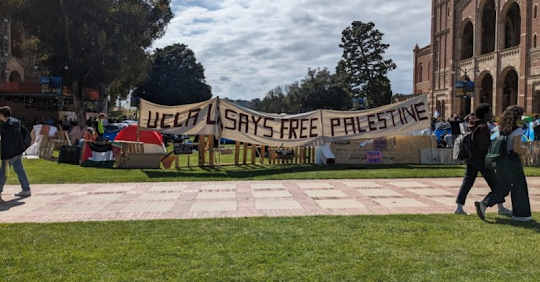Too afraid to actually talk about Palestine, authorities and institutions are resorting to bigotry and censorship
Israeli bombs continue to fall on Gaza, killing Palestinian civilians with abandon. Al Jazeera published a story about the destruction of 24 hospitals in Gaza, each of them bombed mercilessly by the Israeli military. Half of the 35,000 Palestinians killed by Israel were children, their bodies littering the overwhelmed morgues and mosques of Gaza. The former United Nations Assistant Secretary General for Human Rights Andrew Gilmour told BBC Newsnight that the Palestinians are experiencing “collective punishment” and that what we are seeing in Gaza is “probably the highest kill rate of any military, killing anybody, since the Rwandan genocide of 1994.” Meanwhile, in the West Bank section of Palestine, Human Rights Watch shows that the Israeli military has participated in the displacement of Palestinians from 20 communities and has uprooted at least seven communities since October 2023. These are established facts.
Yet, these facts—according to a leaked memorandum—cannot be spoken about in the “newspaper of record” in the United States, the New York Times. Journalists at the paper were asked to avoid the terms “genocide,” “ethnic cleansing,” and “occupied territory.” Indeed, over the past six months, newspapers and television shows in the US have generally written about the genocidal violence using passive voice: bombs fell, people died. Even on social media, where the terrain is often less controlled, the ax fell on key phrases; for instance, despite his professions of commitment to free speech, Elon Musk said that terms such as “decolonization” and phrases such as “from the river to the sea” would be banned on X.
At the University of Southern California (USC), Asna Tabassum, a South Asian American, was to deliver an address on campus to 65,000 people as the valedictorian of the class of 2024. Involved in the conversation around the Israeli war against the Palestinians, Tabassum was targeted by pro-Israeli activists who claimed to feel threatened. On the basis of this feeling of endangerment, whose source the university refused to disclose, USC decided to cancel her speech. In a thoughtful response, Tabassum—who majored in biomedical engineering and history (with a minor in resistance to genocide)—implored her classmates “to think outside the box—to work towards a world where cries of equality and human dignity are not manipulated to be expressions of hatred. I challenge us to respond to ideological discomfort with dialogue and learning, not bigotry and censorship.” Tabassum is 21-years-old. The USC provost who canceled her speech, Andrew Guzman, is 56-years-old. His reasons for shutting her down are less mature than her plea for dialogue. (more...)
Elites in the Global North are scared to talk about Palestine

No comments:
Post a Comment